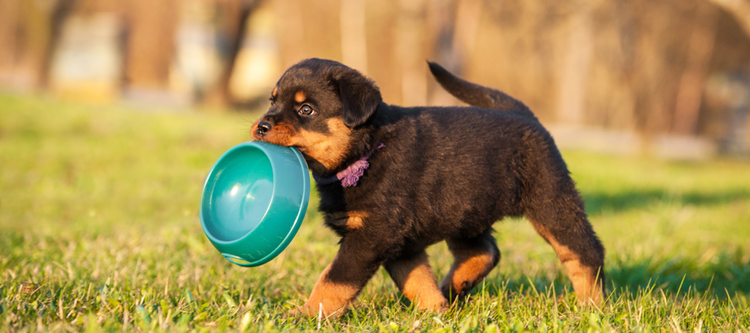
Here’s How to Help a Puppy That Won’t Eat
Having a puppy that won’t eat can be an emergency. Puppies less than three months old, especially the small and toy-breed dogs, are predisposed to juvenile hypoglycemia (low blood sugar) when they don’t eat an adequate amount.
Here are 5 steps to follow if your puppy isn’t eating:
Step 1. Find Out Why Your Puppy Isn’t Eating
The first thing to do is to try to figure out why your puppy isn’t eating. Some reasons a puppy won’t eat may be minor, while others can be serious and even life-threatening.
Here are some causes for inappetence:
- Gastrointestinal parasites (worms), such as roundworms, hookworms, and whipworms
- Viral infections, such as parvovirus or coronavirus
- Intestinal protozoan infections, such as Coccidia or Giardia
- Bacterial infections
- Ingestion of toxins
- Stomach upset from a sudden diet change or table foods
- Getting into the trash and eating spoiled food
- Ingestion of a foreign body (which is an indigestible object, such as sock, toy, or panties)
- Congenital problems, such as a liver shunt or heart defects, as well as many other problems that can affect organ function
Step 2. Evaluate Your Puppy for Symptoms
Carefully look at your puppy for additional symptoms besides the inappetence. Look for any underlying causes and evaluate your puppy for additional abnormal symptoms. Specifically, look for:
- Vomiting and/or diarrhea
- Worms in the stool
- Fleas or ticks
- Lethargy or weakness
- Trembling, muscle twitching, and seizures
- Limping
- Signs of pain or discomfort
- Coughing or trouble breathing
- Pale gums
Step 3. Seek Medical Attention
Once puppies get sick, things can go downhill pretty quickly. Don’t wait too long to seek medical help for a puppy that will not eat. If you see any of the signs above, please consult your veterinarian.
Your veterinarian may ask you about exposure to trash or toxins, history of deworming, vaccine history, and additional symptoms, such as vomiting or diarrhea. They may check your puppy’s body temperature, check a blood glucose level, perform a fecal examination, as well as other tests depending on your puppy’s examination and clinical signs.
Step 4. Try These Tips for Feeding Puppies
Below are tips that can encourage puppies to eat:
- Offer your puppy their regular food. If they refuse, continue on to the next step.
- Moisten the regular food with water or chicken broth for moisture and flavoring. Sometimes, this can make the food more appealing.
- Offer different canned puppy foods to help stimulate your puppy’s appetite. The best approach is to add a small amount of canned food to your puppy’s regular food and hope that they will eat. Canned food can be more palatable and has the additional benefit of having a higher water content, which helps with hydration.
- Feed a bland diet, such as a combination of boiled hamburger with rice. You can purchase a commercial version of this diet, like Hill’s Science Diet i/d, or make your own. Get the recipe here – How to Make a Bland Diet for Your Puppy.
- Heat a small amount of canned food in the microwave for a few seconds to release the aroma and help stimulate interest in the food. Just ensure that the food is not too hot to the touch.
- Offer baby food, such as chicken-flavored food.
- Syringe feed. When mixed with water, baby food or canned dog food can be easy to pull into in a syringe and gently feed. Sometimes, getting a small amount of food into a dog or puppy can encourage them to want to eat more. Please make sure your puppy is alert and has a normal swallowing reflex to minimize the risk for aspiration.
- Only feed a small amount at a time to ensure that your puppy tolerates it and doesn’t start vomiting.
- Besides food, encourage your puppy to drink liquids. Ideas include:
- Adding an ice cube to their water bowl
- Allowing your puppy to lick water from your hand or your finger
- Offering small amounts of Pedialyte®
- Offering low-sodium chicken broth
If you try these tips and your puppy still won’t eat, the best and safest thing is to take your puppy to the veterinarian. If your pet seems weak, becomes unable to stand, and/or you notice any additional muscle twitching, this is an emergency. This can be a sign of low blood sugar. Call your veterinarian immediately or contact the closest emergency clinic. To help low blood sugar, rub Karo® syrup on your puppy’s gums.
Step 5. Remember Things to Avoid
If you’ve figured out why your puppy isn’t eating, avoid similar situations in the future. For example, if your puppy got into the trash, avoid exposure to the trash. If your puppy has worms, make sure you follow the prescribed treatment and ensure that you follow all instructions from your veterinarian.